Related Research Articles
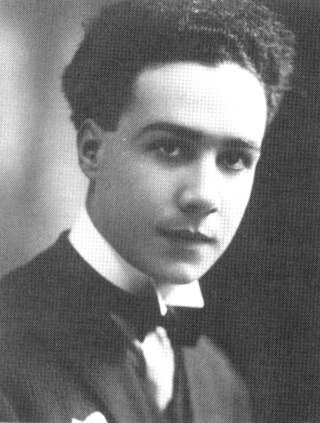
Leopoldo Marechal was one of the most important Argentine writers of the twentieth century.
Andrew Michael Graham-Yooll OBE was an Argentine journalist, the son of a Scottish father and an English mother. He was the author of about thirty books, written in English and Spanish. A State of Fear has become a classic on the years of terror in Argentina.

Gaucho literature, also known as gauchesco ("gauchoesque") genre was a literary movement purporting to use the language of the gauchos, comparable to the American cowboy, and reflecting their mentality. Although earlier works have been identified as gauchoesque, the movement particularly thrived from the 1870s to 1920s in Argentina, Uruguay and southern Brazil after which the movement petered out, although some works continued to be written. Gauchoesque works continue to be read and studied as a significant part of Argentine literary history.

Juan Gelman was an Argentine poet. He published more than twenty books of poetry between 1956 and his death in early 2014. He was a naturalized citizen of Mexico, country where he arrived as a political exile of the Military Junta.
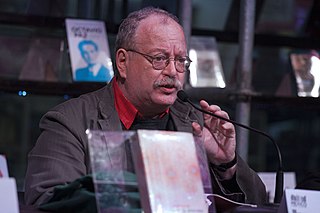
Jorge Fondebrider is an Argentinian poet, critic and translator.

Arturo Carrera is an Argentine poet.

Susana Calandrelli was an Argentine writer and teacher.

Manuel del Cabral was a Dominican poet, writer, and diplomat. The son of Mario Fermín Cabral y Báez, an influential senator during the "Era of Trujillo", he served at the Embassy of the Dominican Republic to Argentina. During his long stay in Buenos Aires, he married an Argentine and fathered his 4 children, among them, the television journalist and politician Peggy Cabral. In 1992 he was awarded the Premio Nacional de Literatura.
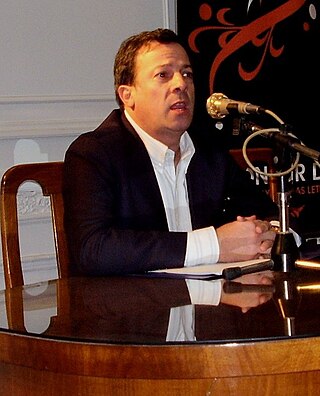
Carlos Alvarado-Larroucau is an Argentine-born French author, born in Argentina in 1964.

Diana Bellessi is an Argentine poet.
Luisa Peluffo is an Argentine writer and journalist.
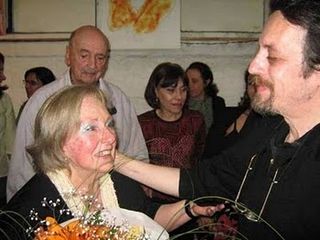
Selva Casal was a Uruguayan poet.
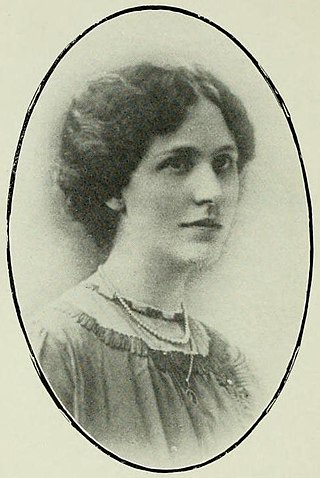
Delfina Bunge de Gálvez was an Argentine writer, poet, essayist and philanthropist.

Emma Barrandeguy was an Argentine writer, journalist, poet, storyteller and playwright.
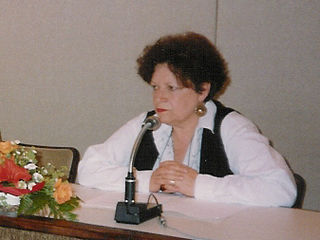
Luisa Futoransky is an Argentine writer, scholar and journalist living in France.
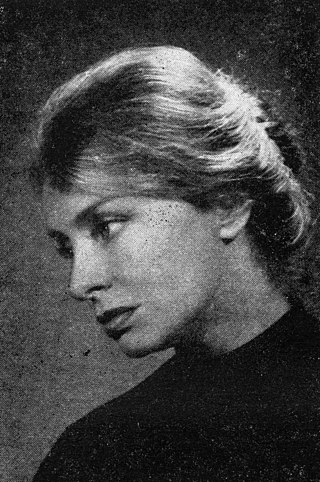
Emma de Cartosio (1928–2013) was an Argentine writer, poet, storyteller, essayist and teacher. The Emma de Cartosio poetry contest was established in Entre Ríos Province in 2015.
Mirta Rosenberg was an Argentinian poet and translator.
Cecilia Pavón is an Argentine writer, poet, and translator who co-founded Belleza y Felicidad. Her works have been translated to English, Portuguese, and French.
Tamara Kamenszain was an Argentine poet and essayist.
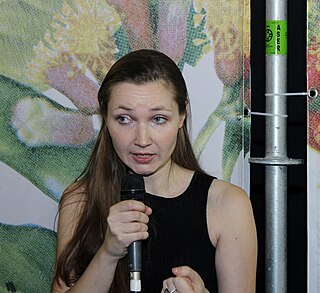
Natalia Litvinova is an Argentinian writer and editor of Belarusian origins, working in the fields of poetry and translation.
References
- ↑ "Calveyra, Arnaldo" (in Spanish). TusQuets Editores. Retrieved 22 May 2012.
- 1 2 "Les écrivains/adhérents" (in French). mel. Retrieved 22 May 2012.
- ↑ "Arnaldo Calveyra". Editorial de la Universidad Nacional de Entre Ríos (in Spanish). Libro Universitario Argentino. Archived from the original on 3 April 2015. Retrieved 22 May 2012.
- ↑ Ioana Catsigyanis. "Arnaldo Calveyra". Ensemble (in Spanish). 7: 467. ISSN 1852-5911. Archived from the original on 14 January 2013. Retrieved 22 May 2012.
- 1 2 3 4 5 6 7 "Arnaldo Calveyra". Buenos Aires Audiovisual Archive (in Spanish). Gobierno de la Ciudad de Buenos Aires. Retrieved 22 May 2012.
- 1 2 3 4 biography found in Calveyra, Arnaldo. Poesia Reunida (complete works of poetry), Editorial Adriana Hidalgo, Buenos Aires, 2008. "Poesía reunida - Arnaldo Calveyra -Adriana Hidalgo Editora". Archived from the original on 14 September 2011. Retrieved 8 March 2012.
- 1 2 "Antología Arnaldo Calveyra" (in Spanish). Autores de Concordia. Archived from the original on 18 January 2015. Retrieved 22 May 2012.
- ↑ "Murió el escritor entrerriano Arnaldo Calveyra a los 85 años, en París".
- ↑ Carraud, Claudio. "Arnaldo Calveyra hace de la poesía una riesgosa aventura". El Miércoles Digital (in Spanish). Archived from the original on 20 May 2012. Retrieved 22 May 2012.
- ↑ Mastronardi, Carlos. Sur Magazine Nº 261. November 1959.
- ↑ "Arnaldo CALVEYRA | Actes Sud".
- ↑ https://www.scribd.com/doc/47415420/10/Arnaldo-Calveyra [ dead link ]